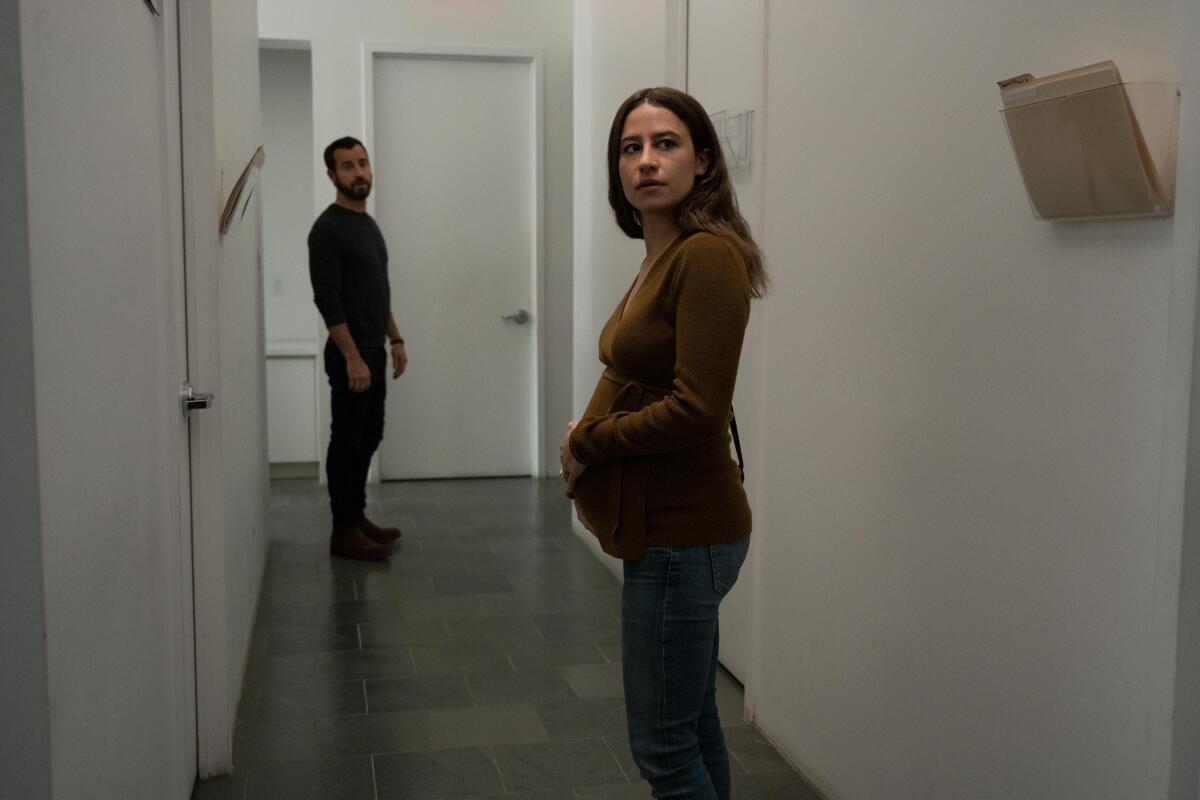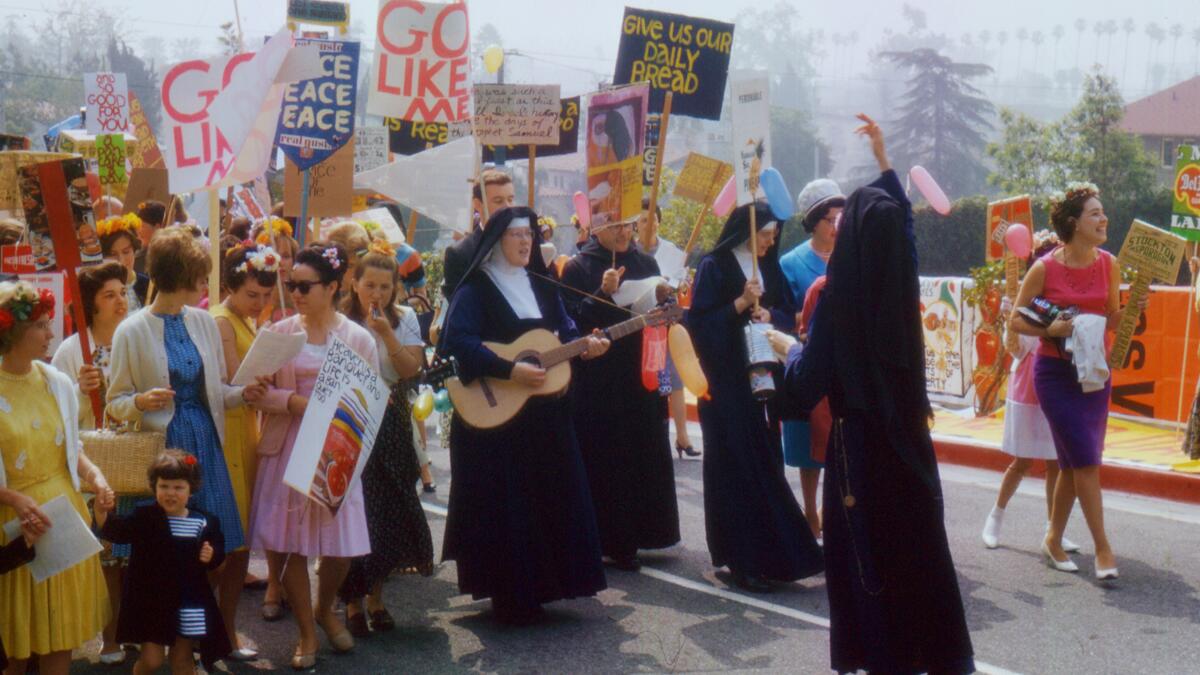Indie Focus: Border-crossing romance in ‘I Carry You With Me’
Hello! I’m Mark Olsen. Welcome to another edition of your regular field guide to a world of Only Good Movies.
Only good movies
Get the Indie Focus newsletter, Mark Olsen's weekly guide to the world of cinema.
You may occasionally receive promotional content from the Los Angeles Times.
Continuing his strong run of stories on the business of movie theaters, Ryan Faughnder took a look at why L.A.’s beloved Vista Theatre has not yet reopened. As owner Lance Alspaugh explained, much-needed, long-promised government funding to assist with renovations has not yet come through.
“It’s bad that we’re all having to wait, that it’s as slow as it’s been,” Alspaugh said. “It’s the difference between if you reopen or do you not reopen.”
One film many theaters that have reopened are hanging their hopes on to revive attendance is “F9,” the latest installment in the long-running franchise — now at 20 years and 10 films. The movie brings back director Justin Lin and actor Sung Kang for another globe-hopping story of cars, crime and family, with series stalwarts such as Vin Diesel, Michelle Rodriguez, Jordana Brewster, Chris “Ludacris” Bridges and Tyrese Gibson and fresher faces such as Charlize Theron and John Cena.
Justin Chang reviewed the film, saying “In ‘F9,’ directed with practiced flair and controlled chaos by the franchise veteran Justin Lin, a car can survive a spin through a live minefield, swing from a vine over an open gorge like Tarzan, hop a ride with a passing aircraft and even blast its way into [spoiler redacted]. As Lin chases his characters around Tokyo and London, pausing for a glamorous rendezvous with Helen Mirren and a too-quickly-abandoned ramen dinner with Rodriguez and Brewster, he sustains a nice balance of the awesome and the absurd.”
Jen Yamato, genuinely one of the world’s top experts and aficionados of the series, dug deep into the return of Lin and Kang and how the series has had such an astonishing ability for reinvention and reinvigoration.
“Good filmmaking is having the ability to pivot because that’s the true nature of making movies,” Diesel, a producer on the franchise as well as its signature star, said. “As filmmakers, we often have the urge to want to be clever in how we use MacGuffins and how we use our plots, and how we pull from gray areas in the past about mythology. And for me, it’s always served me well when I acknowledge those factors and then allow my heart to guide.”
This week on “The Envelope” podcast, I spoke to Janicza Bravo, director and co-writer of “Zola.” The long anticipated movie, starring Taylour Paige and Riley Keough, originally premiered at Sundance in January 2020, but has lost none of its wild, subversive energy in bringing to the screen the story first told in a notorious Twitter thread.
“I think that the content or the work itself feels very alive and very young and it has a kind of of-the-moment quality,” Bravo said. “One of the reasons it might feel so great for right now is that the world of the film is pretty radical. The women in the movie are radical. That a Twitter story was turned into a film is radical. There is so much expression and none of that expression is asking for permission. And I think that all of that just feels like it’s bubbling. It’s ready to explode.”
Enjoying this newsletter? Consider subscribing to the Los Angeles Times
Your support helps us deliver the news that matters most. Become a subscriber.
‘I Carry You With Me’
Directed by Heidi Ewing, known for her work in documentaries, “I Carry You With Me” is a formally complicated story that blurs the lines between fiction and reality in telling the story of Iván García and Geraldo Zabaleta, whose romance takes them from Mexico to New York City and the hardships they face both as a gay couple and as undocumented immigrants. The film is playing now at the Landmark in Los Angeles.
For The Times, Justin Chang wrote, “A time-shifting, form-blurring romance that spans two countries and as many decades, “I Carry You With Me” means to peer behind those masks, to lay bare the unvarnished inner truth of Iván and Gerardo’s life together and apart. You can feel the weight of that purpose in every frame, even when cinematographer Juan Pablo Ramírez gently shakes and rattles the camera in studied pursuit of a raw, kinetic spontaneity. Iván and Gerardo aren’t just fictional constructs but real-life individuals, and Ewing, a close friend of theirs, shows an almost palpable commitment to capturing their love story in all its intimate and epic proportions.”
Carlos Aguilar spoke to Ewing, García and Zabaleta about weaving together fact and fiction to create the film and also the challenges of telling a story so deeply felt by all of them.
Ewing recalled the first time her longtime friends opened up to her, saying, “This is such a potent story of love, triumph and loss, what you give up. I was floored on a personal level and as a storyteller I knew I wasn’t going to be able to get over this story.”
For the New York Times, Jeannette Catsoulis wrote, “Intercutting several timelines, Ewing alights pointedly on the homophobia and familial disapproval that helped propel Iván across the border. Her hybrid, impressionistic style leaves details fuzzy and leans too easily on sentiment; yet it also understands immigrant longing as more complex and elusive than economic imperative. … To Iván, ‘crossing over’ was both an irresistible force and a double-edged sword. After closing a door he may never be able to reopen — and exchanging one source of anxiety for another — he knows there is nothing to do but endure.”
For Variety, Valerie Complex wrote, “Ewing comes from a nonfiction background, and it’s easy to tell that she feels more comfortable with the vérité material when the film begins jumping back and forth between scripted and real-life sequences. Still, the love story of Ivan and Gerardo is an important one, and by sharing it, Ewing brings attention to the challenges facing LGBTQ people in Mexico, encouraging empathy for those who feel compelled to flee to the U.S. in order to live openly. … The segments involving the real Ivan and Gerardo are easier to follow and more engaging, suggesting that ‘I Carry You With Me’ might have worked better as a more conventional documentary.”

‘False Positive’
Directed by John Lee, who co-wrote the screenplay with “Broad City’s” Ilana Glazer, “False Positive” is a story of the anxieties of modern pregnancy. Lucy (Glazer) has been struggling to conceive when her husband (Justin Theroux) pulls strings to get her into a top fertility specialist (Pierce Brosnan), but when there are complications she becomes increasingly distrustful of their true intentions. Having recently premiered at the Tribeca Festival, the film is streaming now on Hulu.
For the Tribune News Service, Katie Walsh explored the film’s connection to “Rosemary’s Baby” when she wrote, “The climax is a combustion of female intuition, rage and deep sorrow; it provides catharsis, the kind that was previously denied to characters like Rosemary. … For all the tightly wound tension that Lee extracts from the first three-quarters of the film, you expect something more evil, perhaps even supernatural to unfold. The foundation is there to take it to even darker places, but perhaps the point of ‘False Positive’ is that we cannot become inured to those all too-plausible villains who walk and work among us — and are applauded. They deserve our full-throated rage and bloodlust too.”
For the New York Times, Beatrice Loayza wrote, “That women continue to lack autonomy over their own bodies is indeed a horrifying reality. But Lee and Glazer, torn between the impulse to satirize an upper-crust milieu of would-be parents and the desire to depict a complex mental breakdown, unleash a watered-down and occasionally contradictory critique of, well, just about everything — white liberals, the health care system, the patriarchy. And despite its vaguely unsettling clinical ambience, very little about the film as it makes its way to an ultimately flat and predictable final twist manages to feel tense or thrilling. Or even funny for that matter.”
For IndieWire, Kate Erbland wrote, “Is ‘False Positive’ really meant to send-up or riff on ‘Rosemary’s Baby’? Surely the cinematic world can (and should!) hold more films about women who are unmoored by pregnancy (and the way the world, especially its men, treat them while they are in such a ‘delicate’ condition) that aren’t automatically compared to an unimpeachable classic. But even if one were to throw the movie math and the attendant expectations out the window, “False Positive” amounts to very little on its own, subtracting away every bit that could make it unique or compelling, ending entirely in the red.”

‘Rebel Hearts’
Directed by Pedro Kos, “Rebel Hearts” is a documentary about a group of progressive nuns at Los Angeles’ Immaculate Heart campus in the 1960s. The film is in limited theatrical release now and will be streaming starting June 27 on Discovery+.
For The Times, Robert Abele wrote, “‘Rebel Hearts,’ which takes the Immaculate Heart community through today’s incarnation, can be uneven in merging its rich narrative and storytelling tactics. Though plenty of gripping firsthand accounts are offered, many from women who have since died, few distinctive personalities come to the forefront. Compared with last year’s hidden-history doc powerhouse ‘Crip Camp,’ which thoughtfully mixed the who with the how they did it, “Rebel Hearts” occasionally misses something in its sweep of events.”
Carolina Miranda recently wrote about the designation of the one-time studio of Corita Kent — one of the most compelling figures in the doc — as a historic-cultural monument. As Carolina said, “The designation is important not just because Kent was an artist whose work was a critical part of the artistic dialogues Los Angeles was having in the 1960s, but also because she represents the rare woman to be honored in the city’s landscape. … The designation is reflective of a shift in preservationists’ thinking about how we acknowledge history — thinking that is less preoccupied with the pristine historical details of a site than in making sure a wide range of histories are acknowledged in a city’s landscape.”
For the Washington Post, Ann Hornaday wrote, “In this swiftly moving, revelatory account, the audience is plunged back into postwar Los Angeles, where the garden-like Immaculate Heart convent was hailed as a ‘spiritual oasis’ within godless Hollywood. Having taken vows of poverty, chastity and obedience, the nuns who lived there were hired as (cheap) teachers at the Catholic schools that were popping up throughout the city; meanwhile, in the college associated with the order, young women were receiving a world-class liberal arts education that encouraged them to think critically about history, politics and their place in a changing world. … On the heels of such similar social histories as ‘Crip Camp’ and ‘9to5: The Story of a Movement,’ ‘Rebel Hearts’ serves as an invaluable reminder of America’s activist history, which has often been at its most vibrant in the most unlikely places.”

Only good movies
Get the Indie Focus newsletter, Mark Olsen's weekly guide to the world of cinema.
You may occasionally receive promotional content from the Los Angeles Times.




